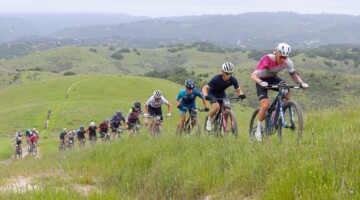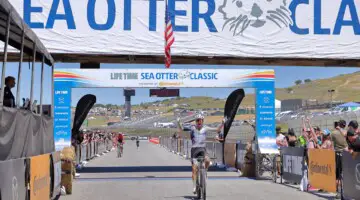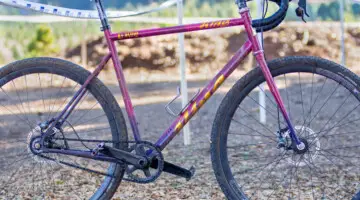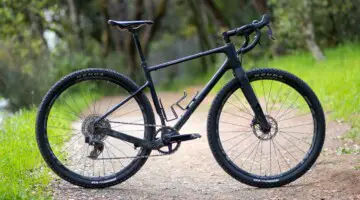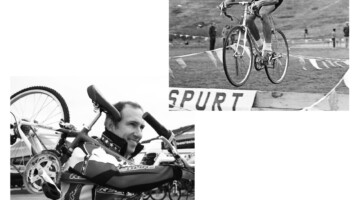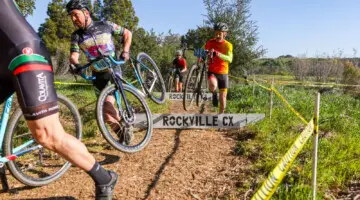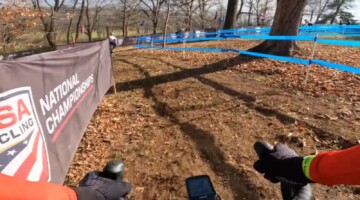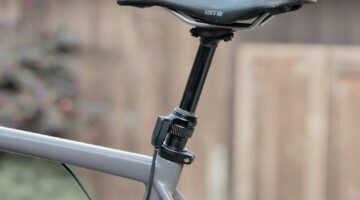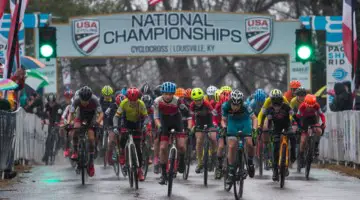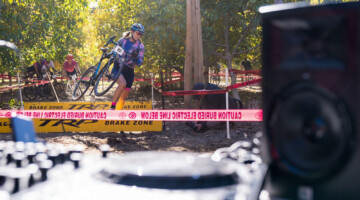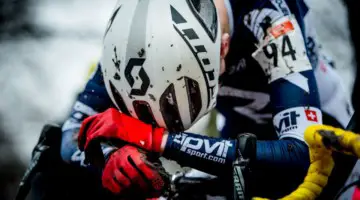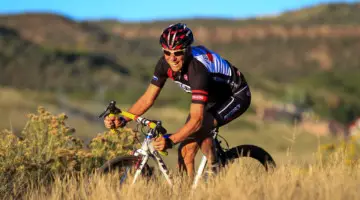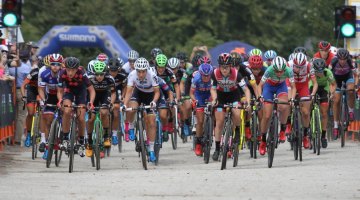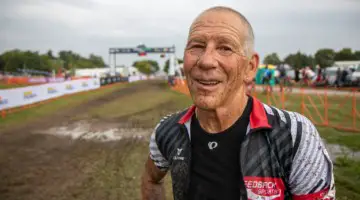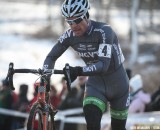
Jonathan Page made it clear he’s not ready to hang up the bike with his National win today © Meg McMahon
By Molly Hurford and Robbie Carver
The Glory
The 2013 Cyclocross Nationals wasn’t found in the dull roar of the fans, the screams, the jeers, the pounding on the course siding along the finishing straight; it wasn’t found in the victory salute, the raised arms, the mud-stained interviews.
No. For us, Nationals was in the silence. The silence that came at the start line, when the officials called 15 seconds, when there was no more warmth to be had, no more jokes to break the growing tension, no last minute advice, no sound but the click of the photographer’s lens. As we collectively held our breath, those fifteen seconds summed up all that makes our sport great – in those fifteen seconds there was nothing but the fierce, focused gaze of dozens of racers staring down months of sacrifice and suffering, staring down the shed pounds, the aching workouts, the fine-tuning gear; staring down 400 meters of pavement and the freezing, muddy pain that awaited them on the other side.
And then all hell broke loose.
Pavement turned to dirt. Dirt flowed into the first 180 turn, frozen chunks of earth the size of softballs pinballing racers into the tape in some races, deep glopping mud stopping their bikes cold in others. Another turn, another straight, and then the first painful climb up Badger hill, leading to the stairs and then the terrifying descent. And there was noise. The noise of ’cross. Of fans and cowbells and horns and heckles. Of curses and catcalls and crashes. And it was beautiful.
It’s easy to get jaded in sport, and in cycling in particular. In a pro peloton, so haunted by whispered rumors, blunt accusations, and scandal after scandal, we sometimes forget the simple joy of the race. Seeing that naked hope, the raw ambition of racers of every age, the despair of missing that pedal stroke that could have changed everything, makes us remember. It’s all laid out on a frozen course. Hungry.
It wasn’t until that silence at the start line that we could feel our hearts beating faster, nervous with anticipation. And when the first racers came into view, we weren’t thinking about the fastest way to tweet out results, or instagramming the perfect picture. For that moment, we weren’t reporters. We were fans. Screaming at the racers who we’ve admired, who we’ve interviewed, who we’ve befriended in the past two years. Last year at Nationals, it was clinical: this is the race, this is the coverage. This year, it felt more personal than it ever has. This year, it meant something more.
The Win
Even though anything can happen in ’cross, Katie Compton’s dominance came as no surprise. The nine-time national champ has arguably had her best season ever, winning the overall World Cup series before returning home to seal another championship, and her commanding display on the ice only reaffirmed her position as one of the greatest athletes of her generation. What made her win – and her race – special, however, was the number of spectators out cheering. Typically, the women’s race is a prelude to the men’s, and the spectators treat it as such, largely ignoring the racing action until the men take to the course. So this year, when spectators lined the hill, screaming for their favorite women, it was heart-warming.
And the men? Announcer Richard Fries nearly lost his voice. Jonathan Page had the ride of his life, coming back from relative obscurity to remind Americans that he is still here, he is still racing for the win, and when the weather turns fierce and the rest fumble, he is right at home.
The camaraderie of the pro field was equally sentimental. “I’m glad he got it,” Tim Johnson panted, rolling in for fifth. Adam Craig said the same. And then the silence – sincere, honored – as Page called his wife to say, in that understated way of his, “I won.” Ryan Trebon leaned over and shook his hand; Page broke out into a huge grin, then mimicked Ryan’s panicked riding that day. While no scene will ever be as iconic as Jeremy Powers’ win last year as he rode, crying, into his fiancé’s arms, as far as moments go, this was one for the books.
The Agony
With temperatures steadily declining as the week wore on and course conditions going from bad to worse, the staff of the event was faced with a monumental task: to keep the pressure washers running, despite no water source on course. And to their credit, they tried. But when there were so few pressure washers that parents and mechanics came to blows in the 17-18 juniors race, the lines for non-racers to wash bikes after a pre-ride were over an hour long, and the water was so cold on Sunday that components and cables froze, it seemed as though some foresight was missing.
And it was the mechanicals during the men’s and women’s races that underscore the agony of ’cross – that it’s not just about the legs, the skill, the tenacity. ’Cross is about luck, as well – and we saw bad luck writ large in both races. If only Nicole Duke’s shifter hadn’t broken. If only Danny Summerhill hadn’t flatted. So much has to go exactly right for the perfect day, and seeing some of those perfect days dashed by equipment failing in the cold – it just stung.
“Can you tell people that I’m really disappointed, but thanks for all the cheering?” a race-worn and devastated Justin Lindine asked me (Molly) after the race, as we sat in the Redline van in silence, both of us shaking from the cold. It wasn’t until after I posted his sentiments to my Facebook and Twitter that I realized just how much this race meant to so many people, because the immediate outpouring of his fans and friends saying that he made the race the most exciting one they’ve watched was spectacular.
And every racer had a cadre of fans behind him or her. Over nationals week, you broke every record Cyclocross Magazine had for site hits. The numbers of people who came and watched Nationals on our site (not the only host of the live stream) was mind boggling: 16,000 watching on our site alone. This is big.
The Stakes
Nationals is special, Katie Compton told us. And she’s right. It’s a race like no other, an event that puts all levels of cyclocross on a pedestal. It’s uniquely American, one of the few Nationals worldwide where the event isn’t just for the pro categories, but spans from 10-year-olds to the 70+ category. It showcases what American ‘cross is about: participation, not simply hero worship.
Even so, we do have our heroes, and Sunday was all about watching them fight on one of the toughest courses around, for one of the most coveted titles, as well as a spot on the most highly regarded teams: the US Worlds team. With a number of spots still open, and a strong Nationals performance the deed to tip the scale, fans and racers alike waited in baited anticipation for USA Cycling’s decision following the race.
When the list was posted Monday afternoon, it felt like high school: who had made the varsity football team? There were names we expected to see on the list, and names we were surprised by. None were undeserving. Frankly, the opposite was true: the US has come up so far in the past few years in cyclocross that there were simply too many names in for consideration, too many viable candidates. We all have our favorites, we all have the man or woman we were desperately hoping would be picked. And USA Cycling was faced with some tough decisions. How much weight should Nationals results carry? How important is a focus on cyclocross versus other disciplines? Who has had the best overall season? Who has the most Euro race experience, or past Worlds experience? We don’t envy them the decision making process, nor would we want to be tasked with the job. But we would have loved to be a fly on the wall as they made the final decisions.
As for us, we’re about to head to Louisville for Worlds. We hope we’ll see you there.


